Contents
Capital allowances on property come in several types, each with dynamic and intricate rules. These allowances are not automatic and must always be claimed via tax return. Many commercial property and holiday let owners in the UK may be unaware that they can claim tax relief on their property investments or, if they do, how to maximise their claims.
Without knowledge and expert advice, businesses miss out on capital allowances, leaving HMRC with massive portions of unclaimed amounts. In this article, we explore the fundamental aspects of capital allowances UK and the latest changes.
Quick Introduction to Capital Allowances
Generally, capital allowances are claimable deductions for eligible business expenses, the main purpose of which is to reduce tax liability. They can be claimed by businesses of all sizes, from sole traders to large firms. They do not come as an automatic deduction and must be claimed via income tax return or self-assessment.
However, whilst capital allowance provides significant tax relief, many taxpayers do not fully understand its full scope. One common misunderstanding is that capital expenditure can only be claimed allowance within the year it was made.
Such a practice may be highly recommended, but there is no specific legislation that sets a time limit for when to include the assets upon claiming for allowance. If the business still owns and uses the item, and it is considered as a qualifying expense, it is still possible to claim capital allowance for it regardless of when the purchase was incurred and of its market value depreciation.

It is not a requirement to claim capital allowance, but when taxpayers do, it is best to seek tax professionals’ service, as any errors and inaccuracies can easily attract HMRC penalties. Underclaiming is also prevalent. In this case, taxpayers do not fully maximise the reliefs they are eligible for, which could have led to huge tax savings and more resources for growth.
What Are Capital Allowances on Property Investments?
Capital allowances on real property investments reduce taxpayers’ bills by allowing deductions of qualifying expenses in the taxable income. They can only be claimed by a UK company, partner, or individual who uses the property assets solely for commercial purposes.
Capital allowance is not considered a loss, although it can also be carried forward to offset future profits and spread throughout the next tax years until full relief is granted.
What Are Considered Qualifying Expenditures?
Expenses incurred for the following may qualify for rental property income allowance:
- Nursing Homes
- Hotels
- Rental Property (e.g., House, Apartment, Etc.)
- Retail and Shopping Centres
- Offices
- Banks
- Restaurants
- Hospitals
- Factory and Manufacturing Plants
Most assets purchased for commercial properties are under the plant and machinery category. The following are the main qualifying expenditures:
- Costs associated with demolishing plant and machinery
- Some fixtures, such as fitted kitchens or bathroom suites
- Items used for business purposes, including cars
- Alterations to a building for the installation of plant and machinery (excluding repairs)
- Parts of a building deemed integral, also known as ‘integral features’
Any plant and machinery used for business and personal purposes do not benefit from full plant and machinery capital allowances, only the part used for business. The assets must be wholly and exclusively for business purposes (e.g., rental activities for holiday lets, etc.).
Benefits of Claiming UK Property Capital Allowances
Claiming capital allowances is a great way for taxpayers to lower their tax bills and boost their financial situation. Here are some reasons UK entities should not miss out on this tax relief:
- Reduced tax liability. Property businesses can lower their taxable profits, which can lead to hefty tax savings.
- Cash flow improvement. Eligible taxpayers can get relief for the cost of the asset in the same year of purchase, even up to the full amount.
- Increased profitability. With less tax to pay, businesses obtain more free funds to reinvest for growth and improvement.
What Are the Types of Capital Allowances?
The type of allowance to claim depends on the taxpayers’ situation, as each form has its own unique requirements and characteristics. Claiming the right type can greatly help reduce the cost of property investments.
Annual Investment Allowance (AIA)
The Annual Investment Allowance (AIA) allows businesses to deduct a large portion of their spending on certain plant and machinery from their taxable profits in the same tax year they incurred it.
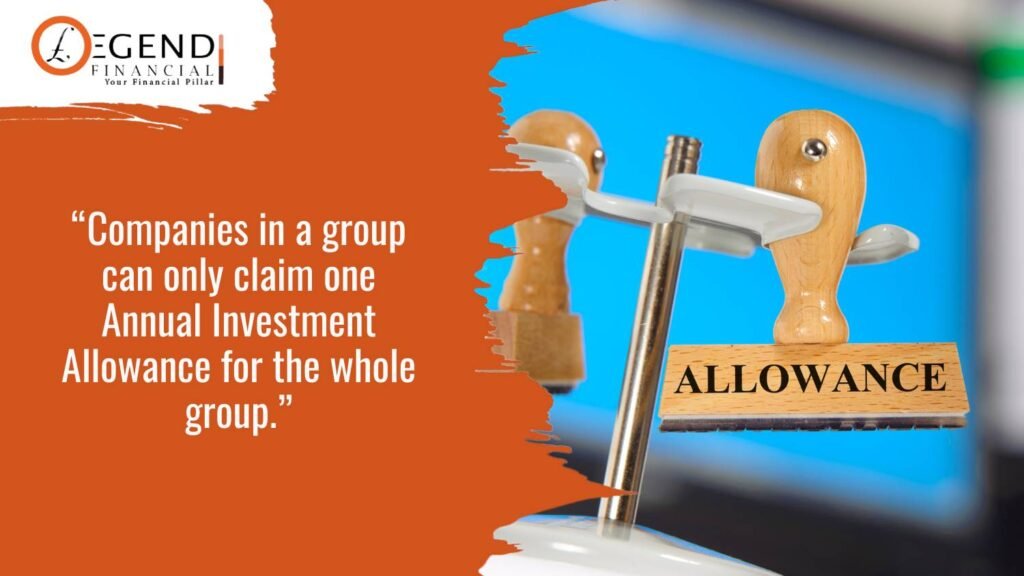
The AIA allowed up to £1 million for new investments between 1 January 2019 and 31 March 2023, but it has been permanently increased since 1 April 2023. Businesses can subtract the full value of their investments from their profits before calculating the tax bill.
100% First Year Allowance (FYA)
The 100% First Year Allowance (FYA) allows full cost deduction of qualifying purchases from businesses’ taxable profits in the year the expenses were incurred. Since the entire cost can be deducted in the first year, there is no need to spread the cost over several years through Writing Down Allowances (see below).
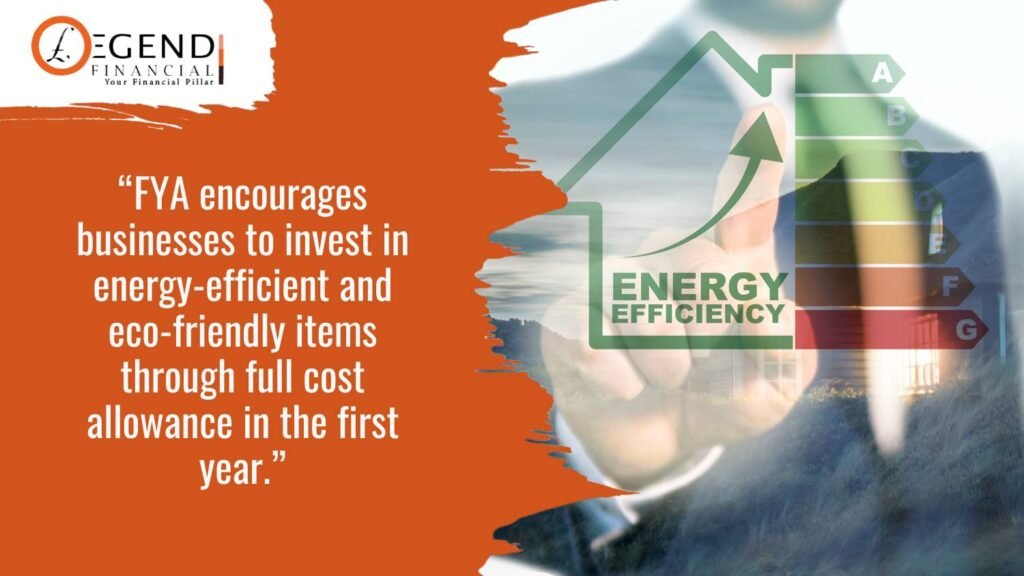
This allowance applies to specific assets, such as energy-saving equipment and cars with low CO2 emissions. The 100% allowances on energy and water-saving technologies were abolished in April 2020. Currently, FYA is only available for a limited number of items.
Writing-Down Allowance (WDA)
Those who cannot claim the AIA or the FYA can opt for the Writing-Down Allowance (WDA) instead. WDA is not as immediate as AIA or FYA, as it follows the same concept of depreciation deduction. The value of assets decreases annually, and the allowance is calculated based on this depreciation percentage rather than the original cost.
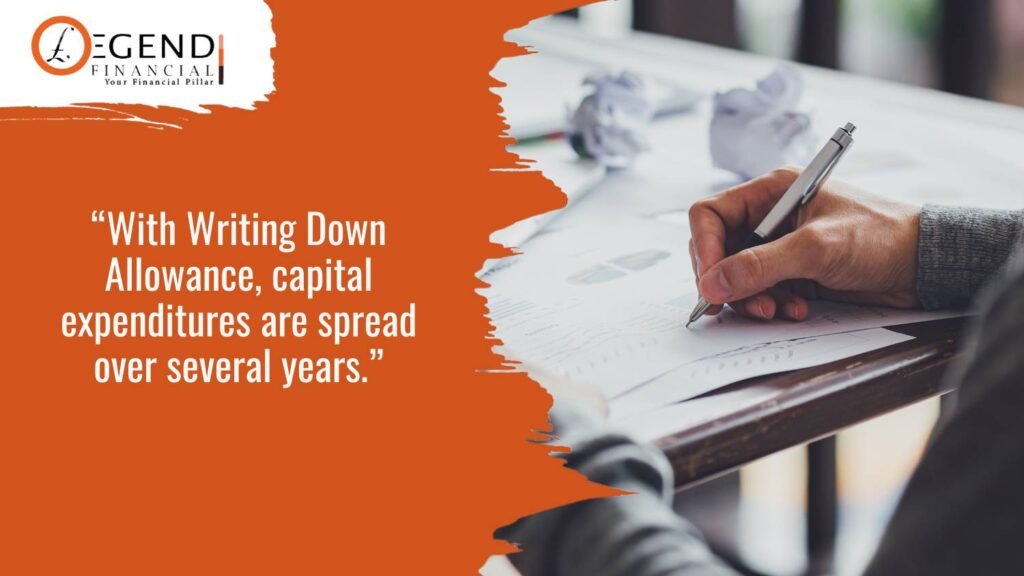
Specifically, the allowance is applied to the remaining balance of capital expenditure not yet claimed, including previous years’ balances and new expenditures minus any proceeds from disposals. There are two pools: the main pool with a WDA rate of 18 per cent and the special rate pool of 6 per cent.
Expenses, for example, that qualify for allowances at the lower special rate are integral features in a building. These may include lifts or electrical systems. Items that have a working life of more than 25 years, termed “life-long assets,” may also qualify for the lower special rate.
Structures and Building Allowance (SBAs)
Structures and Buildings Allowance (SBAs) provide tax relief for construction costs incurred on commercial properties. This allowance covers various structures and buildings, including offices, retail and wholesale premises, as well as renovations or conversions of existing commercial structures. Dwelling unit and land expenditures, or any cost of the building itself, are not within its scope.
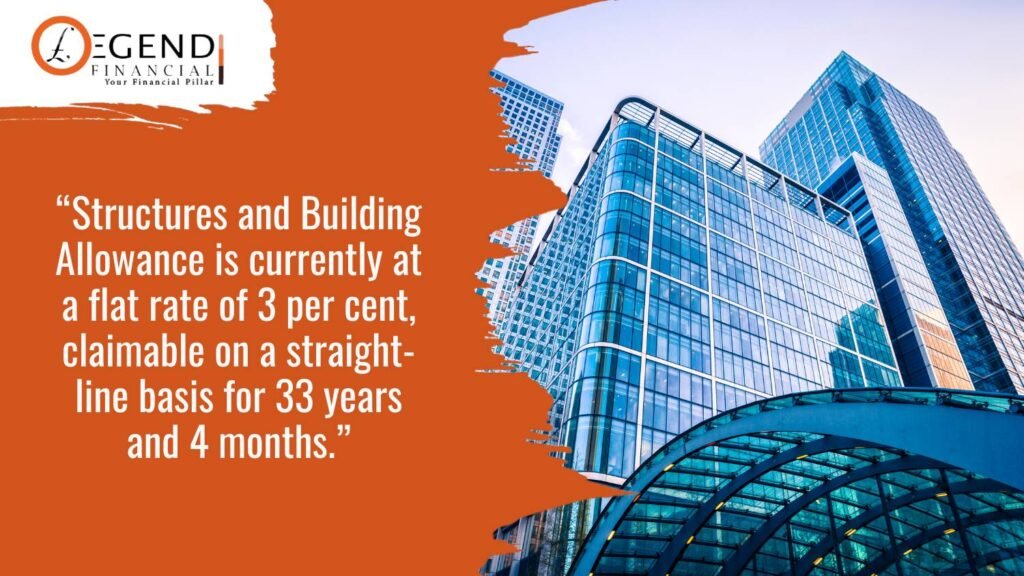
Currently, the allowance is at a flat rate of 3 per cent per year, which has increased by 1 per cent since April 2020. SBAs must be claimed via a straight line method of thirty-three years and four months. Properties in freeport tax sites may qualify for a higher rate. There are now more than forty new enterprise zones offering benefits like business rates reductions and simplified planning processes.
Super Deduction
The Super Deduction allowance was introduced in the 2021 Spring Budget, effective from 1 April 2021 to 31 March 2023. Whilst it ended on 31 March last year, qualifying plant and machinery expenses are still claimable within the allowance period.
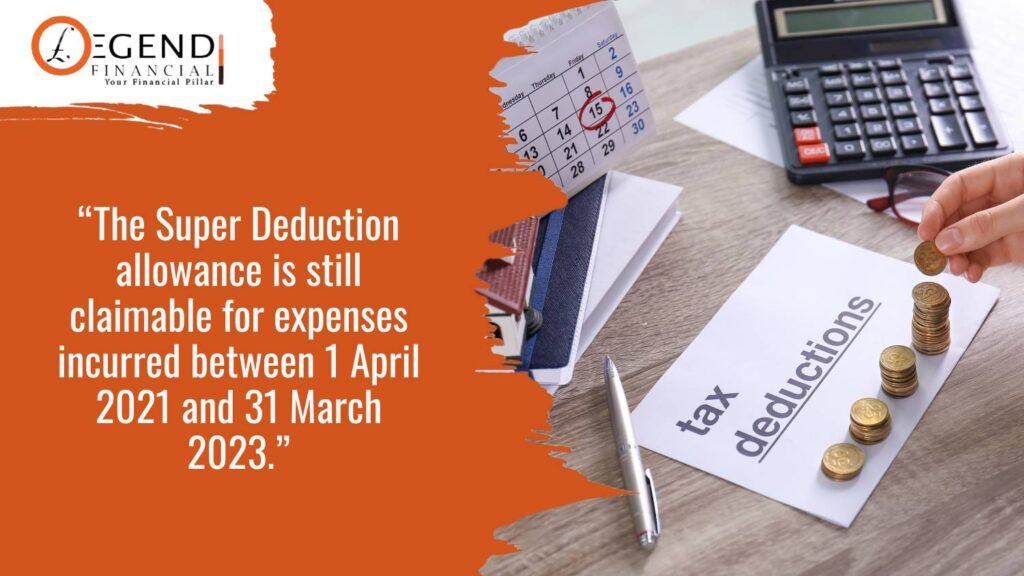
Through the super deduction, companies could deduct 130% of their actual spending from their taxes, giving them a 30% increase. For instance, if a company spent £10,000, it could claim £13,000 in capital allowances.
50% First Year Allowance (50% FYA)
The 50% FYA, also known as SR allowance, is like the super deduction allowance above but offers a 50 per cent deduction. It applies to special rate capital expenditure on plant and machinery incurred by companies, originally with a similar time frame as super deduction, from 1 April 2021 to 31 March 2023.
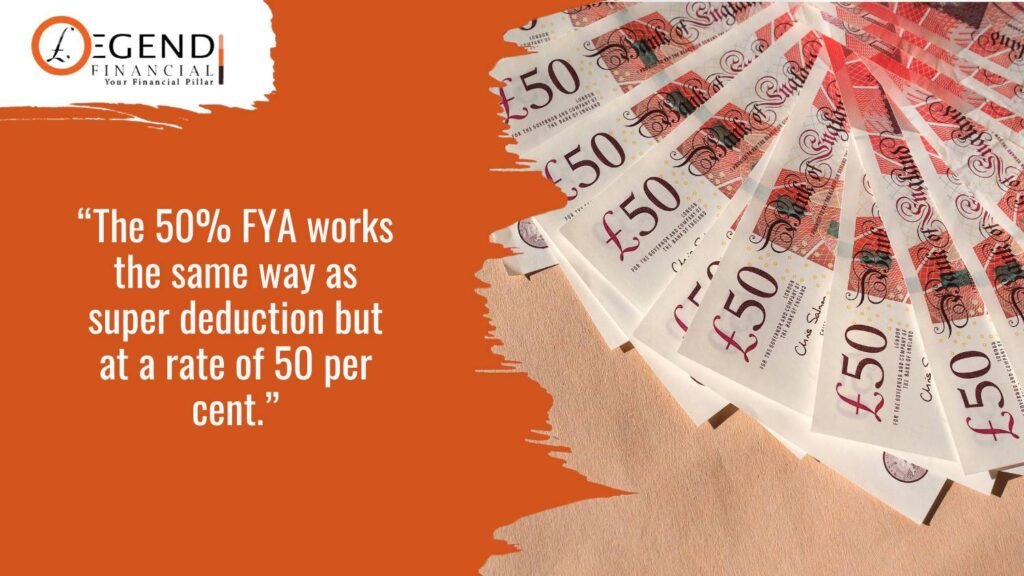
In the 2023 Spring Budget, the SR allowance was extended for three more years until 31 March 2026. This means property businesses can now deduct 50 per cent of the cost of eligible assets from their profits before tax for an extended period.
Full Expensing
Introduced in the 2023 Spring Budget, Full Expensing replaced the super deduction allowance, which allowed businesses to deduct 30 per cent more than their actual expenditure. Instead of the 130 per cent super deduction, full expensing allowance provides companies with a 100 per cent relief of their spending on plant and machinery from their taxable income in the year they made the purchase.
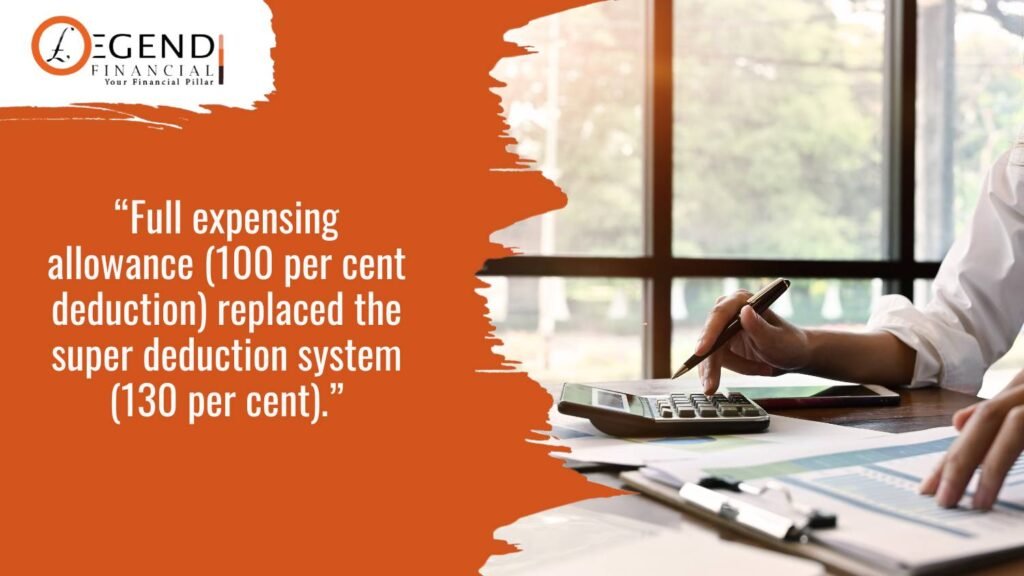
To qualify for plant and machinery allowances, the assets must be new and unused and acquired after 1 April 2023. They must not be gifts, cars, or assets leased to others. For special rate pool items like air-conditioning and lighting, companies can claim a 50 per cent allowance in the first year. The remaining 50 per cent is deducted annually through the usual pooling process.
Balancing Allowances and Charges
This applies when the property owner sells or disposes of an asset less than its original market price for tax purposes. Through this method, the individual can claim Balancing Allowance, which will reduce their capital gains tax. This also works the other way. If they sell the estate way more than its original value, they will face the Balancing Charge, which will increase their real estate taxes as a result.
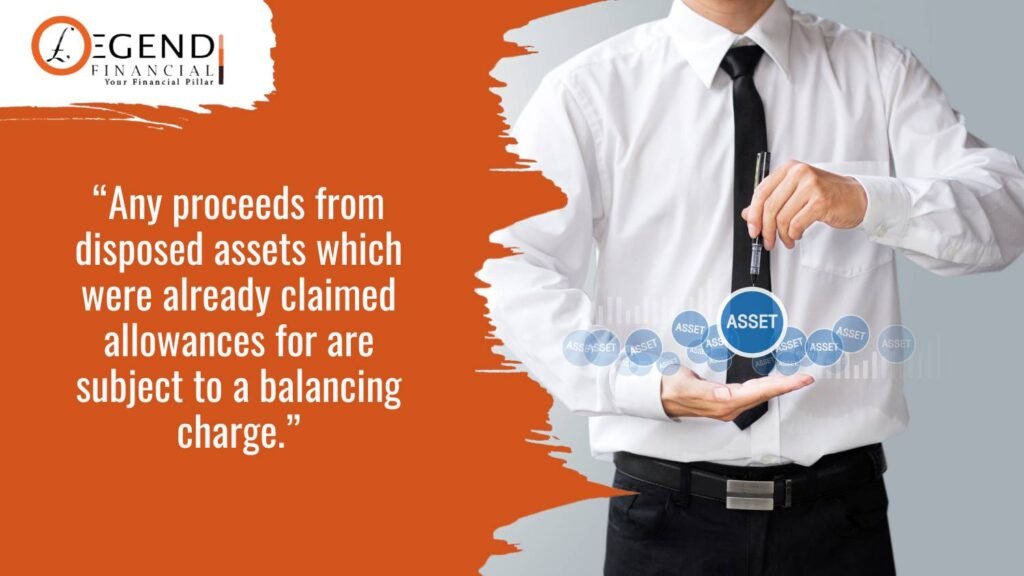
With a myriad of capital allowances to explore and the dynamic rules around them, opting for UK tax specialist services will make the choice and overall process easier.
How Are Capital Allowances on Property Calculated?
Calculating capital allowances begins with identifying the eligible plant and machinery expenses, asset rates, and the applicable type of allowance. The amount to claim is then worked out by multiplying the qualifying expenditure with the applicable tax rate.
These calculations are carried out for each accounting period and are considered as a business expense. They are subtracted from the trading profit to determine the net profit. Here is an example calculation for a business claiming capital allowances through WDA:
- The business purchases £10,000 worth of qualifying assets.
- With an 18 per cent WDA rate, it receives £1,800 in allowances in the first year.
- This leaves the business with a claimable amount of £8,200.
- In the subsequent years, the allowances are based on this reduced value, resulting in £1,476.
This cycle continues until all allowances are fully claimed or until the asset is sold. For accounting periods shorter or longer than 12 months, allowances should be on an adjusted basis. For instance, for an 18-month period, allowances would be calculated as 18/12th of the usual amount.
How Can You Claim Capital Allowances?
Capital allowances are not automatic. They must be claimed through tax returns, the process of which may not be as straightforward as it looks. Claiming capital allowances goes beyond deducting qualifying expenditures.
Taxpayers will have to consider several factors, such as types of property, investments, allowances, expenses, timing of filing the tax return, and more. Seeking guidance from a professional tax advisor can ensure correct claims and maximise potential savings.
Professional guidance proves to be even more beneficial, especially in complex situations. An advisor can help identify eligible claims and ensure accuracy, from understanding the FYA for energy-efficient purchases to navigating WDAs for items not qualifying for AIA or FYA.
How Can You Maximise Capital Allowance Claims?
Here are how taxpayers can obtain the full potential of capital allowances:
Timing of Expenditure
Property businesses should strategically plan the timing of their expenses. By incurring capital expenditures earlier in the tax year, they can increase their claim, allowing enough time to calculate and optimise tax savings.
Meeting Deadlines
Failure to meet deadlines can result in missed tax relief opportunities. For example, not claiming the annual investment allowance within the year of purchase can lead to lost tax benefits. The deadline for claiming allowances depends on the type of tax return.
For income tax returns, the deadline is January 31st after the end of the tax year, with an option to amend for another 12 months. For corporation tax returns, the deadline is 12 months after the end of the accounting period, with an option to amend for another 12 months.
If HMRC investigates the tax return, the deadline to claim capital allowances is extended. Property businesses can then amend their claim 30 days after the investigation concludes.
Maintaining Accurate Records
Failing to claim the correct amount of capital allowances often occurs due to inaccurate records of asset costs or incorrect application of allowance rates. This may lead to HMRC penalties, which could have been prevented by maintaining accurate records of all fixed assets, including cost, purchase date, and asset type.
Ensuring Eligibility
Many businesses overlook eligible assets for capital allowances, resulting in missed tax relief opportunities. It is essential that they keep detailed records of fixed assets and ensure they meet the criteria. Thoroughly reviewing their assets can help prevent missing out on qualifying expenditures.
Seeking Professional Advice
Tax laws and regulations governing capital allowances are complex and subject to frequent changes. Property businesses should seek professional advice from experienced tax professionals to maximise their capital allowances. Professionals can provide guidance on the most up-to-date rules and requirements, ensuring accurate claim amounts and avoiding costly mistakes.
Frequently Asked Questions
If the property business is already writing a loss for tax purposes or is currently benefiting from other tax breaks, it is much better not to claim capital allowances. In this case, not claiming means they increase the amount of tax written–down value carried over to the next period, resulting in larger capital allowance claims in the following years.
Usually, non-trading companies are not eligible for capital allowances because they do not use capital assets for business activities. However, there could be exceptions if the non-trading company spends capital on specific projects, like building new structures for future use.
This depends on the specific type of tax return that taxpayers file. The deadlines for claiming capital allowances are discussed above.
There is no specific rule in the UK regarding time limits of claiming capital allowances, except for the first-year capital allowances that, in nature, must be claimed the same year the qualifying expense was incurred.
Depreciation determines the declining value of assets. Capital allowance may also be called tax depreciation, as it is basically a tax–deductible version of depreciation.
How Legend Financial Can Help
Capital allowances on property investments are one of the most poorly understood aspects of UK taxes. Rules change in Budget statements now and then. Moreover, maximising the claimable amount is more complex than simply identifying qualifying business expenses and calculating what HMRC owes back. It needs brilliant strategising, including the timing of capital asset spending, when not to claim, and more.
If you aim to maximise this financial support, Legend Financial’s tax accountants are here to guide you throughout. For years, we have helped all kinds of clients nail this case, ensuring they claim tax relief up to the last pound. Talk to one of our experts today!











